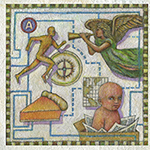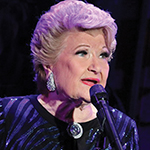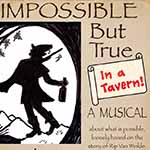“Outside-the-Box” Cabaret
Michael Kirk Lane Reprises Memorable Show on Tuesday, March 1
February 26, 2016
Interview by Rob Lester for Cabaret Scenes
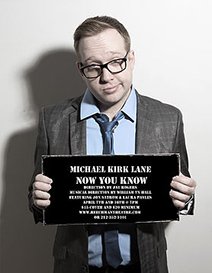
As another Manhattan March approaches, we’ll be hearing the slogan “March Is ‘Cabaret Month,’” with the annual awards shows and that annual sometimes logical meteorological observation, “March comes in like a lion and goes out like a lamb.” Who can say, what with this winter’s VERY odd weather days, but in Cabaret Land, when March first comes along this coming Tuesday, it won’t be coming in like a Cowardly Lion. That’s because there’s a brave performance being reprised on that night at the Laurie Beechman Theatre in the West Bank Café on West 42 Street. Now You Know is a piece I saw and reviewed a few months ago that shook me and stayed with me because it’s powerful, gripping, and maybe because most of all—it’s a harrowing story that is a true and truly shocking life experience told on stage by the man who lived through it. Now, you know Now You Know’s autobiographical figure if you’ve spent a night at the Beechman as he’s the guy who usually greets, meets, and even seats you: the friendly and easygoing Michael Kirk Lane. Or you may remember him from similar duties when he managed nights four blocks north at Don’t Tell Mama, where he also sang and emceed frequently in the piano bar in the outer or inner room. His own solo cabaret show there found him indulging in his longtime fondness for all things Muppet.
He’s worked as an actor and teacher and comes off as a friendly, cheerful guy with a happy song in his heart and head. Who would have guessed he’s been through hell?
Now You Know is far from your typical cabaret show. It’s a hybrid—virtually a one-act play with two co-stars that becomes a three-handkerchief weeper when we hear what he went through and kept mostly private for a long time. Like Alice falling down the rabbit hole, he was suddenly falling into a new world that made no sense and was threatening and bizarre. And returning to a safe place where things seemed normal was not necessarily an option and truth was in the eye of the beholder. In a whirlwind of events that then turned into a slow-motion, dragged-out process, Michael found himself unjustly accused of something and soon had to have a lawyer and many headaches and heartaches. I’m guessing that it’s not what you’re guessing. But the red tape of the so-called “justice” system and its ridiculous maneuverings made his life a true nightmare that dragged on and on and on. How does someone cope? Is sharing the story liberating? I’m purposely being vague about the specifics—and for his own reasons Michael’s stage presentation does not reveal all the courthouse and legal mechanics.
This lover of Broadway musicals and pop music found a way to use songs to comment on the episodes and express how he felt at different junctures. (See link below for a video preview.) And the material takes on new shades of meaning in the context of his story. It works. The show’s title song is by Stephen Sondheim from Merrily We Roll Along, the sobering wake-up call about how the world can turn ugly and unfair and hope and naïve belief in what’s right prevailing can crash and burn and leave a scar (“OK, now you know: Life is crummy… Bricks can fall out of clear blue skies…. “). Disillusionment stings and loss of control is scary. Points taken—and well demonstrated! I asked him why and when he decided to open up and put his story on stage before those he knows and total strangers. He told me, “I can’t remember when exactly during the seven and a half years the show covers that the decision was made, but I knew I needed to turn the situation, that I had so little control over, into something I could own. While the events were still unfolding I began to think that I would turn it into some sort of performance piece. Perhaps I was looking for artistic catharsis or exorcising of the story.”
Some time has passed and perspective has come along. He acknowledges this, telling me, “If I had tried to tell this story while I was still living it, the show would have been much darker in tone, as those were the feelings I was living in at the time.” And he knew he needed musical variety so the piece would not “get bogged down in emotional ballad after emotional ballad.” He’d decided early on to have William TN Hall as his musical director. “He had done my previous cabaret show, in addition to years of working in piano bar with me, and we work very well together.”
Maybe it’s partly Michael’s deep-rooted sense of humor and belief in himself that helped save him. Indeed the show has much humor—both dark and cutely frothy—than you’d expect. Hiring a wise and wordly clown as director was key. He chose actor-singer-comedian and smarty-pants cabaret veteran, the wickedly funny Jay Rogers. The jolly Rogers could probably squeeze whipped cream from a sour pickle and make the Angel of Death tap dance. Knowing points can be made with humor and audiences would not welcome a pure pity party, he wasn’t about to let Lane linger in the “Poor Me” territory or vent relentlessly. Michael explained, “After our first meeting where Jay heard more of the story and a few of the song ideas I had already gathered, we agreed the best approach would be to treat the show not as if we were writing a cabaret, but as if we were writing a small one-act musical.” And, he added, “We wanted to let the songs tell as much of this complicated story as possible. I then came to Jay and Will with lists of about three songs that could fit each story moment of the show and we worked together to find the best arc for the show. Jay really helped to find the truth and conciseness of the story.”
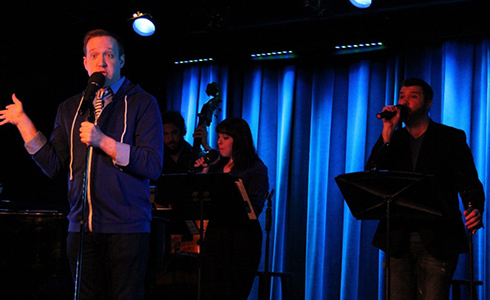
Photo: Russ Weatherford
Though the saga has real sadness and anger and toughness, they tried to incorporate “a comedic or ironic way to look at some of the hardest story points, saving the real ballads for where the emotion would ring the truest. I must say that I have never laughed so hard as the day Jay, Will and I were putting together what became the epic comedic medley that represents one of the truly darkest moments in the real story.” Laughter may be the best medicine, but it is not a panacea. The ordeal he was reliving while turning it into a stage portrait and cautionary tale naturally opened up wounds not that far from his emotional epidermis. “Even in the comedy there were definitely rehearsals where the sense memory from the situation became very real. That is also why I asked two of my best friends, Jon Satrom and Laura Pavles—who luckily are both incredibly talented—to join me.” These singers, who add enormously to the show, give him support theatrically, vocally, and emotionally. Rather than reciting the events and being the sole commentator, he likes to be able “to play off of” them. It’s indeed a fortuitous harmony in all ways; the pair also serve as witnesses to the truth and terrors, as in ancient Greek theater traditions. The back-and-forth sparks of interaction are effective, but the generous Lane and Rogers made sure that Satrom and Pavles, adept solo vocalists themselves, have time in the spotlight alone in ways that enhance the piece and also let them shine. Their past camaraderie as singers/employees pays off and the comfort and affection are palpable.
(These two friends and talents still work at Don’t Tell Mama behind the bar and in front of audiences, including current participation in the delightful monthly series Ricky Ritzel’s Broadway.)
Now You Know is a team effort with true collaboration. Happily, Michael remarked, “We work so seamlessly together that there are some jokes and moments that now—almost a year after the first performance—we can’t remember who initially came up with them. Was it I with the story, Will sensing a fun musical moment, or Jay being his usual genius self?” And he wanted to make sure to express his gratitude for the reception and the unexpectedly sweet lemonade that came from life handing him lemons, explaining, “This show has truly been a catharsis and a labor of love. I’m very lucky to get to turn a negative situation in a show where I get to make joy and music with some amazing friends.”
The performance on Tuesday, March 1 is at 7 pm at the Laurie Beechman Theatre, 407 West 42 Street (at corner of Ninth Avenue), downstairs in the West Bank Café. Call for reservations: 212-695-6909. Cover charge is $15 plus a $20 minimum (food and/or drink): (OK, now you know!) You can make reservations online at http://www.westbankcafe.com/#!laurie-beechman-theatre/s78r1
YouTube video clips of the show: https://www.youtube.com/watch?v=noMIIFPGmuc
Cabaret Scenes review: https://cabaretscenes.org/2015/12/03/michael-kirk-lane-now-you-know/
Visit: www.michaelkirklane.com


